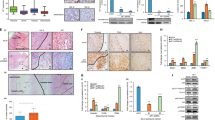Abstract
Several inherited predisposition to cancer syndromes are associated with the development of nervous system tumors. Tuberous sclerosis complex (TSC) is an autosomal dominant disorder in which affected individuals are at risk for developing astrocytomas. One of the genes responsible for this disorder is TSC2, located on chromosome 16p, and encoding a 180 kDa protein (tuberin) that functions in part as a negative regulator of rap1. Previous studies from our laboratory demonstrated that 30% of sporadic astrocytomas have reduced or absent tuberin expression. In addition to loss of tuberin in sporadic astrocytomas, aberrant rap1 mediated signaling may also result from overexpression of rap1. In this study, we test the hypothesis that alterations in the rap1 signaling pathway are frequently observed in certain subsets of gliomas compared to other tumors of the nervous system. Analysis of sporadic astrocytomas and ependymomas demonstrated either increased rap1 or reduced/absent tuberin protein expression in 50 – 60% of different cohorts of these gliomas, compared to 30 – 33% of sporadic schwannomas and meningiomas and none of eight oligodendrocyte tumors. These results suggest that alterations in the rap1 signaling pathway are important in the development of certain sporadic human gliomas.
Similar content being viewed by others
Author information
Authors and Affiliations
Rights and permissions
About this article
Cite this article
Gutmann, D., Saporito-Irwin, S., DeClue, J. et al. Alterations in the rap1 signaling pathway are common in human gliomas. Oncogene 15, 1611–1616 (1997). https://doi.org/10.1038/sj.onc.1201314
Received:
Revised:
Accepted:
Issue Date:
DOI: https://doi.org/10.1038/sj.onc.1201314
- Springer Nature Limited
Keywords
This article is cited by
-
Ras-related protein 1 and the insulin-like growth factor type I receptor are associated with risk of progression in patients diagnosed with carcinoma in situ
Breast Cancer Research and Treatment (2011)
-
Heterozygosity for the tuberous sclerosis complex (TSC) gene products results in increased astrocyte numbers and decreased p27-Kip1 expression in TSC2+/− cells
Oncogene (2002)




